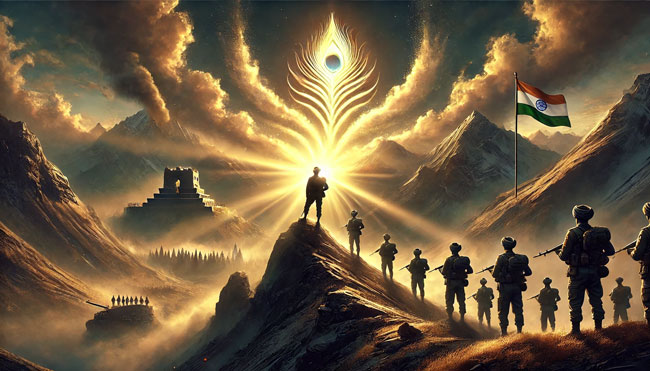It is in moments of crisis that the true character of a nation, a society, and an individual is revealed. When the enemy has crossed all bounds of deceit, when the blood of innocents flows like a stream, the response, too, must descend like thunder. The fearless and piercingly decisive response of the Indian armed forces and leadership to Pakistan’s terrorist audacity is not merely commendable—it is an epic of valor.
The blood-soaked tragedy of Pahalgam shook the very soul of India. In that moment, the heart of the nation was not inflamed by a cry for justice—but by a demand for retribution.
Pakistan is not a nation—it is a laboratory of terror that has played with gunpowder since its very inception. This time, India did not merely defend; it crossed the line, struck deep, and turned the dens of terror—nurtured under Pakistan’s toxic shadow—into ash. This was not just a military action—it was a moment of historic restraint reaching its limit, erupting into decisive action.
We are a country that observed silence even after 26/11. That silence emboldened the enemy. But Operation Sindoor broke tradition—this time, it was the gun that spoke, and it carved emptiness into the enemy’s chest. When enemy drones dared breach Indian skies, they were shot down midair. And then we crossed over and declared, “This time, there will be no mercy.” This was not a call for peace—it was the hour of reckoning.
And then—just as they always do—some false messiahs of peace and pseudo-liberals began to flicker like dim lamps in the dark. “Say no to war,” they chanted. Voices that had, until recently, demanded retaliation, suddenly began to preach nonviolence. They forgot the plight of Indian victims and wept instead for Pakistani citizens. Is this compassion—or a collapse of moral clarity?
Such elements must be reminded: India has suffered less at the hands of foreign invaders than it has from the inaction, delusion, and escapism of its own. Is it not a historical truth that the British crushed India using the blood of Indian sepoys? These lessons of history must now be read in a new language—one not of confusion, but of clarity.
The pens of today’s liberal thinkers sing odes to peace, but their ink is laced with opportunism, delusion, and self-interest. They know well that the liberalism, freedom, and secularism they trumpet would be unthinkable in intolerant states like Pakistan. Only in India can they call even anti-national rhetoric an exercise of free speech.
But when a nation stands at the edge of an existential moment, such “freedom” begins to serve the enemy’s cause. It is dangerous to forget that when soldiers advance at the frontlines, even a single voice raised in doubt from the rear can shatter their spirit.
Wars are not fought only on the battlefield—they are waged in the realm of ideas as well. When soldiers bleed for the nation, to sow seeds of defeat through the veil of words is nothing short of treason. And it must be remembered: Ram and Krishna were not merely symbols of peace—they were warriors blessed by the goddess of battle. They fought when justice itself was under assault.
The essence of the Mahabharata lies in the truth that fleeing from war is an invitation to evil. The Gita inspires not retreat, but righteous action. Krishna rebuked Arjuna not for weakness, but for attempting to escape his duty—because at that moment, to fight was not an option, it was an obligation.
Talk of peace is noble—only when the enemy desires peace. But when Pakistan speaks the language of Hamas, when it bathes in innocent blood and openly invites war, then chanting “No to war” is not virtue—it is suicide.
A society that fears war is erased from history. But India is a nation that rewrites its destiny through war. This is the land of the Buddha—and of the battle goddess. Here, compassion and fury, sacrifice and strength, coexist in harmony.
Peace is a virtue—but only until it does not trample on self-respect. When a nation’s very survival is at stake, war is no longer a choice—it becomes a sacred duty. In such moments, even war cries become part of the battle—they are not mere sounds, but mantras that echo in the hearts of soldiers.
So recognize those who now hold aloft torches in the name of peace. Remember them. Their so-called sensitivity is, in truth, silence in the face of treachery. Reject them—because defending the soul of the nation is our first and final duty.
Jai Hind.




